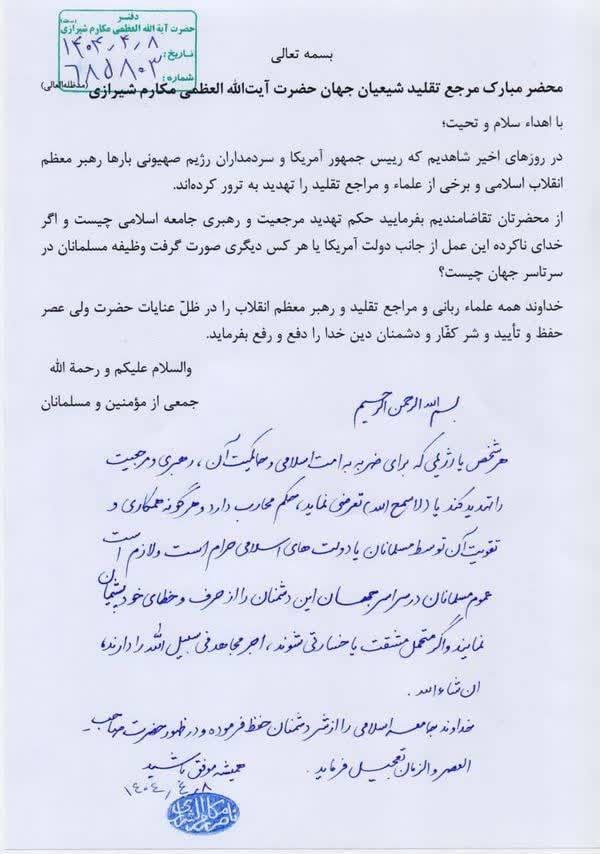Iran has issued what may be an indirect but unmistakable warning to U.S. President Donald Trump following Trump’s recent statements about Supreme Leader Ali Khamenei.
Trump’s comment, made during a press briefing nearly two weeks ago did not go unnoticed by the reclusive regime of the Shia Islamic nation.
They considered it both provocative and ominous.
“We are not going to take him out — at least not for now,” Trump had said, referring to Iran’s top leader. He described Khamenei as “an easy target.”
The comment, which echoed past tensions between Washington and Tehran, stirred fury in Iran.
Death Ruling Declared by Top Iranian Cleric
In response, senior Iranian cleric Ayatollah Nasser Makarem Shirazi issued a religious edict, also know as a fatwa, though without naming Trump directly.
The statement was reported by Iran’s state news agency, IRNA.
Shirazi declared that under Islamic law, anyone who threatens or harms an Islamic government or its leaders is a Mohareb—an enemy of God.

“Anyone—whether an individual or a regime—who threatens the Islamic Ummah, its leadership, or religious authority, or (God forbid) attempts any aggression against them, is classified as a muharib (one who wages war against God). Any form of cooperation or support for such individuals or regimes by Muslims or Islamic governments is strictly forbidden (haram).
“It is incumbent upon all Muslims across the world to make such enemies regret their words and actions. Those who endure hardship or loss in doing so shall, God willing, be rewarded as mujahideen fi sabilillah (strivers in the path of God).
“May Allah protect the Islamic community from the harm of its enemies and hasten the reappearance of the Master of the Age (Imam Mahdi, may peace be upon him). May you always be successful.”
“Such a person deserves death,” the Ayatollah ruled.
He insisted that it was not only a lawful punishment but a sacred duty for Muslims to hold such people accountable.
“It is a religious obligation to deal with enemies of Islam who attack its leaders,” he said.
Islamic Law Used to Justify Threat
Shirazi, one of the most influential religious figures in Qom, described the punishment as grounded in Islamic jurisprudence.
He added that those who punish such enemies are considered mujahideen—holy warriors.
“They are assured of divine blessing for their efforts,” he said.
Though Iran stopped short of an official government statement threatening Trump directly, the weight of a fatwa from Shirazi is seen as a clear message.
Iran’s use of Mohareb designations has a long and severe history—often applied in cases of treason or rebellion.
Rising Tensions Amid a Fragile Calm
The situation adds another layer of unease to already tense U.S.-Iran relations.
Trump’s earlier decision to order the assassination of Qasem Soleimani, Iran’s top general, in 2020 remains a burning issue in Iranian political memory.
Iran’s conservative clerics have vowed revenge ever since.
Shirazi’s recent ruling could be viewed as an escalation or a formal religious response to Trump’s remarks.
There has been no public reaction yet from Trump or his office regarding the fatwa.
Rate, Like 👍, Comment💬, share this article, Follow us on our social media handles, and Submit your own story to get featured and earn rewards!






